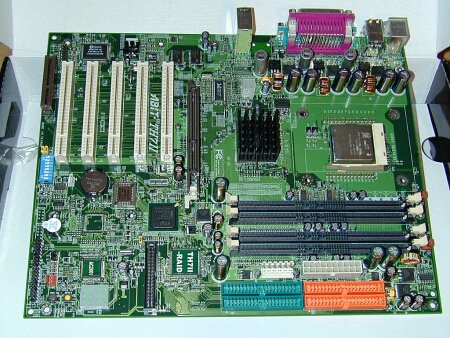Hot Hardware laat alvast het nieuwste Abit mobo zien voor Pentium 4 met Socket478, welke ze binnenkort aan een test gaan onderwerpen. Het betreft de rond Intel's i850 chipset gebouwde TH7II-RAID die medio september zal uitkomen, het logische vervolg op de TH7-RAID met Socket423. De Socket478 biedt plaats voor de nieuwste Pentium 4 processoren, Prescott (Willamette 0,18 micron core) en Northwood (0,13 micron core 512KB). De specs van beide mobo's komen vrijwel overeen, met als belangrijkste verschil dat de nieuwere TH7II-RAID nu wél is uitgerust met Abit's Softmenu III. Softmenu biedt tweaking van Vcore, Vio en de FSB in stappen van 1MHz. Tot de verdere standaarduitrusting van dit ATX bord behoort ondermeer support voor 2GB dual-channel PC800 RDRAM, Ultra DMA/100 RAID (RAID0/1/0+1) met een Highpoint HPT370 IDE controller, 5 PCI sloten, 3 USB poorten, dual-channel AC'97 Audio, een AGP4x slot en een optionele geïntegreerde 10/100Mb LAN controller:
On board ATA100 RAID of course is included and there are a few more bells and whistles the first rev of the TH7-RAID didn't have, namely Softmenu III support! The PLL used on the TH7II-RAID is from the same company that Abit uses for most Softmenu III designs, Realtek Semiconductor. Another very nice feature of the TH7II-RAID is one that was carried over form the original TH7. The board has two small momentary button switches, for reset and power on functions. This makes life ease for folks, like us here at HotHardware, that don't always install boards into a case for testing. Simply plug in your cables, and power supply, hit the power on button on the board and she'll boot right up!
Finally, not to be forgotten is our first look at a live Socket 478 Pentium 4 CPU. These things are tiny when compared to T-Birds or the Socket 423 Pentium 4. Again, the mPGA 478 version of the Pentium 4 has, you guessed it, 478 pins. There are many more power and ground pins in this version of the chip, which will help to stabilize the part at speeds at 2GHz. and higher. Intel simply didn't have the mPGA 478 ready in time for launch of the Pentium 4, so they went with the PGA 423 package which was more mature at the time. However, all furture clock speeds beyond 2GHz. will be in this new mPGA 478 package.
 |

:strip_exif()/i/1000147245.jpg?f=thumbmedium)